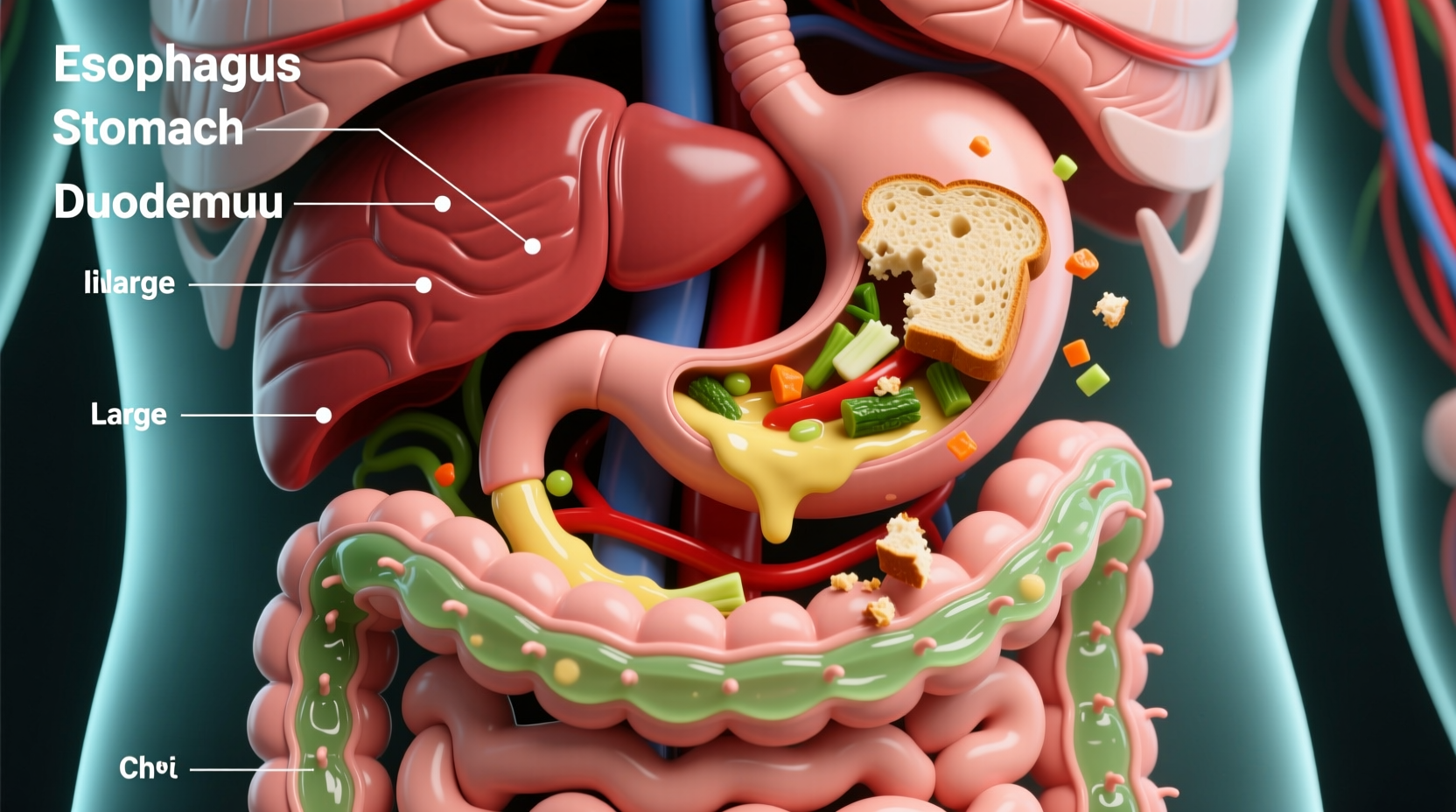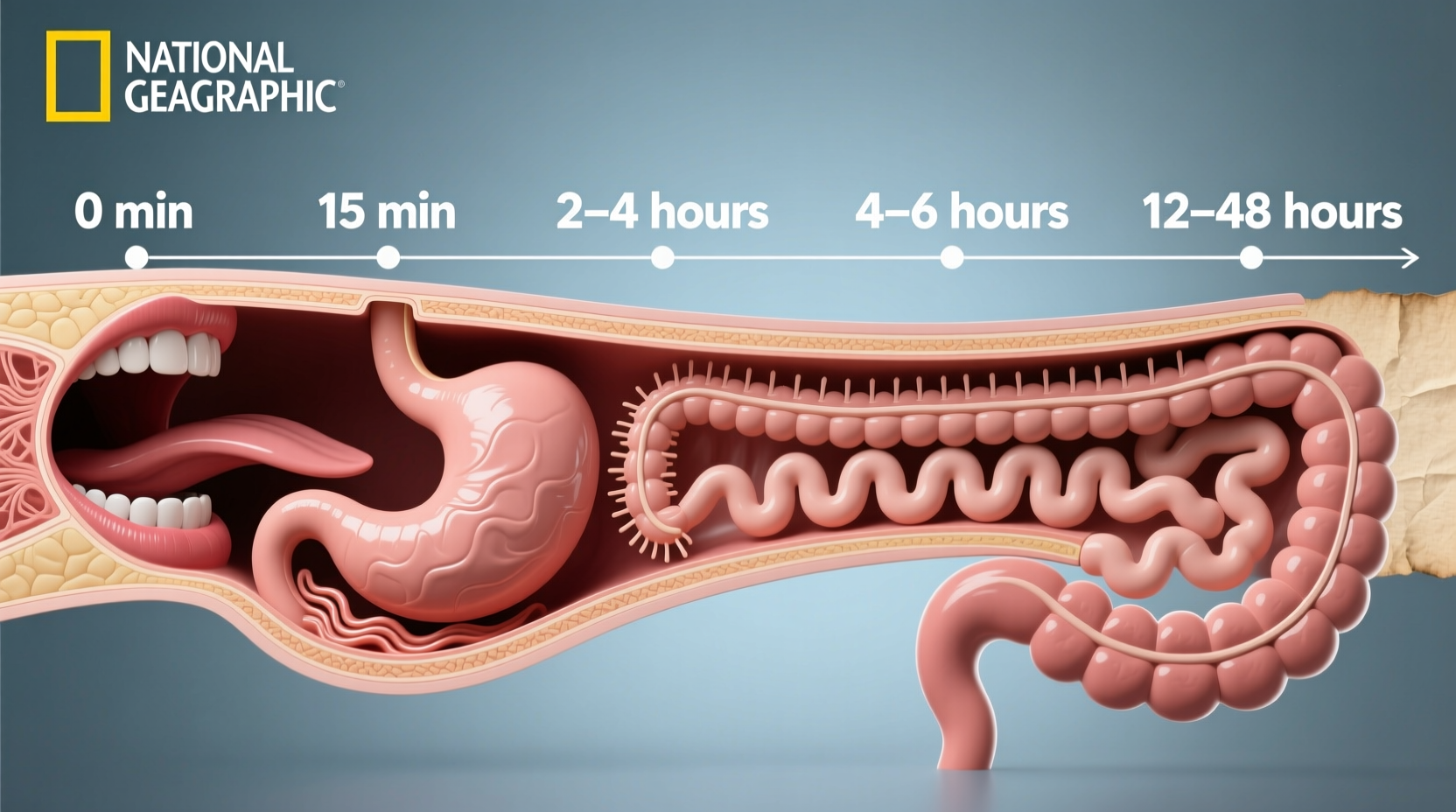Understanding how long food takes to digest isn't just academic curiosity—it directly impacts your energy levels, nutrient absorption, and overall digestive health. Whether you're timing meals around workouts, managing digestive discomfort, or simply optimizing your nutrition, knowing these timeframes helps you make informed decisions about what and when to eat.
The Complete Digestion Timeline: From First Bite to Final Exit
Your digestive system works like a well-orchestrated assembly line, with each stage serving a specific purpose. According to the National Institute of Diabetes and Digestive and Kidney Diseases, the journey begins the moment food enters your mouth and continues until waste is eliminated.
Here's the typical progression:
| Digestive Stage | Location | Duration | Key Processes |
|---|---|---|---|
| Oral Phase | Mouth | 30-60 seconds | Saliva breaks down carbs, chewing creates smaller particles |
| Gastric Phase | Stomach | 2-5 hours | Protein breakdown begins, food mixes with gastric juices |
| Small Intestine | Duodenum to Ileum | 2-6 hours | Nutrient absorption, bile and enzymes break down fats |
| Large Intestine | Colon | 10-59 hours | Water absorption, fiber fermentation, waste formation |
This comprehensive digestion timeline explains why what you eat for breakfast affects your afternoon energy levels, and why dinner choices impact morning digestion. The stomach's role as the primary processing center determines how quickly nutrients enter the bloodstream—making stomach emptying time particularly relevant for meal timing decisions.
How Different Foods Digest: A Practical Comparison
Not all foods move through your system at the same pace. The Johns Hopkins Medicine research shows that food composition dramatically affects digestion speed:
- Simple carbohydrates (white bread, sugary snacks): Begin digesting in the mouth, leave the stomach in 30-60 minutes
- Complex carbohydrates (whole grains, legumes): Take 2-3 hours to exit the stomach due to fiber content
- Proteins (meat, fish, eggs): Require 3-4 hours in the stomach for initial breakdown
- Fats (avocado, nuts, oils): Slow digestion significantly, taking 6-8 hours to leave the stomach
- Fiber-rich foods (vegetables, fruits): Speed transit through the large intestine despite slowing stomach emptying
Consider this real-world example: That avocado toast with egg you enjoyed for breakfast? The bread components began digesting immediately, the egg protein took about 3.5 hours to process in your stomach, while the healthy fats from the avocado continued working through your system for nearly 8 hours. This explains why balanced meals provide sustained energy compared to simple carbohydrate snacks that digest too quickly.

Factors That Change Your Personal Digestion Timeline
Your individual digestion speed isn't fixed—it fluctuates based on several factors. The Centers for Disease Control and Prevention notes these key variables that affect how long food takes to digest:
Metabolic Influences
Age significantly impacts digestion time, with transit slowing by approximately 15% between ages 20-60. Gender plays a role too—women typically experience 20-30% longer transit times through the large intestine than men, particularly during certain menstrual cycle phases.
Lifestyle Factors
Physical activity accelerates digestion—moderate walking after meals can reduce stomach emptying time by 25%. Conversely, stress triggers the "fight or flight" response that diverts blood flow from digestion, potentially doubling transit time through the small intestine.
Medical Context Boundaries
It's crucial to recognize when digestion times fall outside normal parameters. While standard digestion ranges apply to healthy adults, certain conditions alter these timelines:
- Gastroparesis (delayed stomach emptying) can extend gastric phase to 5-10 hours
- Irritable Bowel Syndrome often shortens large intestine transit to 6-10 hours
- Type 2 diabetes may increase total digestion time by 30-50%
- Post-cholecystectomy (gallbladder removal) speeds fat digestion by 25-40%
These variations explain why generalized digestion timelines serve as starting points rather than universal rules. Your personal digestive rhythm depends on your unique physiology and circumstances.
Practical Applications: Using Digestion Knowledge Daily
Understanding digestion timing isn't just theoretical—it has immediate practical applications for optimizing your daily routine:
Meal Timing Strategies
For optimal performance, time your meals according to digestion science. Consume simple carbohydrates 30-60 minutes before exercise for quick energy, while complex meals with protein and fats require 3-4 hours before intense activity. This prevents the "food coma" effect when blood diverts to digestion instead of muscles.
Digestive Health Monitoring
Track your personal digestion timeline using the corn test: Eat a serving of sweet corn and note when you first see undigested kernels in stool. This simple method reveals your actual transit time through the large intestine. Normal results appear within 24-48 hours; faster than 12 hours suggests rapid transit, while longer than 72 hours indicates slow motility.
Food Combining Principles
Strategic food pairing can optimize digestion timing. Pair vitamin C-rich foods with iron sources to enhance absorption within the 2-3 hour small intestine window. Avoid combining high-fat foods with large carbohydrate portions, as fats slow stomach emptying and may cause fermentation of undigested carbs.
When Digestion Times Warrant Attention
While digestion times vary, certain patterns signal potential issues. Consult a healthcare provider if you consistently experience:
- Stomach emptying faster than 1 hour with simple carbs (possible dumping syndrome)
- Food remaining in stomach longer than 5 hours (potential gastroparesis)
- Total transit time under 10 hours with loose stools (possible malabsorption)
- Transit time exceeding 72 hours with constipation (possible motility disorder)
Remember that occasional variations are normal—stress, travel, or dietary changes temporarily affect digestion. Consistent patterns outside typical ranges deserve professional evaluation.
Optimizing Your Digestive Timeline Naturally
You can positively influence your digestion speed through evidence-based practices:
- Hydration strategy: Drink 8-16 oz of water 30 minutes before meals to support gastric juice production without diluting them during eating
- Mindful eating: Chewing food 20-30 times per bite increases oral phase digestion by 40%, reducing stomach workload
- Post-meal movement: Gentle walking for 10-15 minutes after eating improves gastric emptying rate by 25%
- Strategic fiber intake: Consume soluble fiber (oats, apples) with meals to moderate digestion speed, insoluble fiber (wheat bran, vegetables) between meals to promote regularity
These practical techniques help maintain optimal digestion timing without drastic dietary changes. Small adjustments to eating habits can significantly improve how your body processes food.











 浙公网安备
33010002000092号
浙公网安备
33010002000092号 浙B2-20120091-4
浙B2-20120091-4